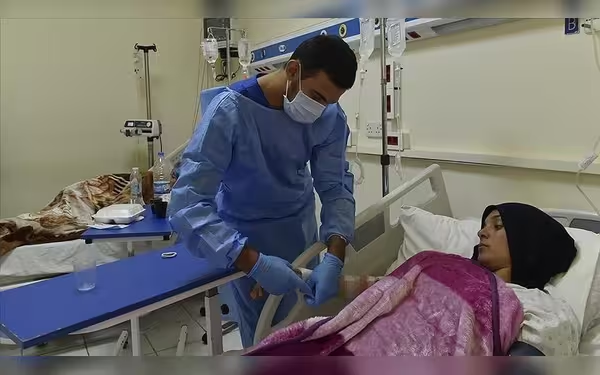Saturday, November 16, 2024 07:35 PM
WHO Warns of High Cholera Risk in Lebanon Amid Conflict
- WHO confirms first cholera case in northern Lebanon.
- Displacement from conflict areas increases cholera transmission risk.
- Cholera vaccination campaign launched despite ongoing violence.
 Image Credits: thefrontierpost
Image Credits: thefrontierpostWHO warns of a very high cholera risk in Lebanon due to conflict and displacement, urging immediate action to prevent a health crisis.
The World Health Organization (WHO) has raised alarms regarding the escalating risk of cholera spread in Lebanon, a situation exacerbated by recent displacements due to ongoing conflict. As the country grapples with the fallout from violence, the health crisis looms larger, particularly following the confirmation of the first cholera case in northern Lebanon. This development has sparked serious concerns among health officials and the international community alike.
Abdul Nasir Abubakar, the WHO representative in Lebanon, highlighted the gravity of the situation during a briefing in Geneva. He noted that the confirmed cholera case emerged in an area where the local population had not received vaccinations. The influx of displaced individuals from southern Beirut, who lack immunity to cholera, has significantly heightened the risk of transmission. Abubakar emphasized that the risk is “very high,” particularly in regions where sanitation and access to clean water are already compromised.
In response to this alarming situation, the WHO is collaborating closely with Lebanon’s Health Ministry and various partners to enhance water and sanitation efforts in high-risk areas. WHO chief Tedros Adhanom Ghebreyesus also addressed the issue, revealing that the agency has activated a cholera preparedness and response plan. This plan aims to bolster surveillance and contact tracing, which includes environmental monitoring and water sampling throughout the country.
Furthermore, an oral cholera vaccination campaign targeting 350,000 individuals in high-risk areas has been initiated by the Health Ministry. However, the ongoing violence has disrupted these vital efforts, making it increasingly difficult to reach those in need. Since the escalation of hostilities, the WHO has documented 23 attacks on healthcare facilities, resulting in 72 deaths and 43 injuries among health workers and patients.
The situation in Lebanon serves as a stark reminder of the interconnectedness of health and security. As the conflict continues, the potential for a widespread cholera outbreak poses a significant threat not only to the affected individuals but also to the broader region. It is crucial for the international community to respond swiftly and effectively to mitigate this health crisis. Ensuring access to healthcare, clean water, and sanitation is essential in preventing further deterioration of public health in Lebanon. The time to act is now, as the health of countless individuals hangs in the balance.













